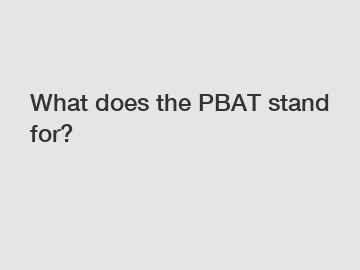What does the PBAT stand for?
What Does PBAT Stand For?
In the world of acronyms and abbreviations, PBAT is one that may leave many people scratching their heads. PBAT stands for Polybutylene Adipate Terephthalate, which is a type of biodegradable plastic. This versatile material has gained popularity due to its eco-friendly composition and wide range of applications. In this article, we will delve deeper into what PBAT is, its characteristics, and its various uses.
Characteristics of PBAT.

PBAT is a biodegradable polyester that consists of four different components: polybutylene adipate, terephthalic acid, butanediol, and a small amount of an alkane diol. This combination gives PBAT its unique set of characteristics, making it a preferred choice for various industries. One of the key features of PBAT is its biodegradability, which means it can break down naturally over time through microbial activity.
PBAT is also known for its excellent mechanical strength and flexibility. This makes it suitable for applications that require durability, such as packaging films, agricultural films, and disposable cutlery. Moreover, PBAT has good melt processability, allowing it to be easily molded into different shapes and forms.
Applications of PBAT.
1. Packaging Films: PBAT's excellent mechanical properties and biodegradability make it an ideal choice for packaging films. It can be used in food packaging, shopping bags, and other applications where a sustainable solution is desired. PBAT films provide adequate protection for the packaged goods while also reducing the environmental impact.
2. Agricultural Films: PBAT is increasingly being used in agriculture due to its biodegradable nature. It is used for mulching films, greenhouse films, and compostable plant pots. PBAT films help to reduce waste and pollution in the agricultural sector, promoting sustainable farming practices.
3. Disposable Cutlery: Single-use plastic cutlery has become a significant environmental concern. PBAT-based disposable cutlery provides a viable alternative as it can degrade naturally after use. These utensils offer the convenience of single-use items while minimizing the harm to the environment.
4. Personal Care Products: PBAT is also used in the production of personal care products such as wipes, diapers, and feminine hygiene products. The biodegradable nature of PBAT makes it an eco-friendly choice for these items, which are typically used in high volumes and disposed of frequently.
Closing Thoughts.
As the world becomes more conscious of environmental issues, the demand for sustainable materials continues to rise. PBAT, or Polybutylene Adipate Terephthalate, is a biodegradable plastic that offers a potential solution to the problem of plastic waste. Its characteristics, including biodegradability, mechanical strength, and flexibility, make it a versatile material with various applications.
From packaging films to agricultural films and even disposable cutlery, PBAT offers a greener alternative to traditional plastics. Its potential to break down naturally over time reduces the accumulation of plastic waste in landfills and oceans.
To learn more about PBAT and its uses, or if you have any questions, please do not hesitate to contact us. We are here to provide you with further information and assistance in adopting sustainable solutions for your specific needs. Together, we can contribute to a cleaner and greener future.
Contact Us: [Insert contact information here].
Contact us to discuss your requirements of custom biodegradable plastic bag, biodegradable plastic bags suppliers, pbat manufacturing process. Our experienced sales team can help you identify the options that best suit your needs.

Comments